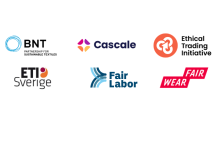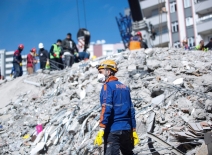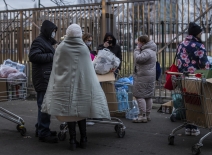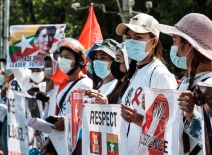Human rights due diligence in challenging contexts: Joint ETIs report
Joint statement for responsible business conduct in Bangladesh

ETI runs a number of initiatives, detailed below, focused on supporting heightened human rights due diligence in contexts that are defined as challenging or affected by crises.
Business is increasingly operating in challenging contexts, where human rights are under additional pressure due to conflicts, or systematic and state-imposed violations of human rights; or where national regulation or its enforcement is affected and fails to protect the human rights of citizens. These are defined by the UN Office of the High Commissioner for human rights (OHCHR) as challenging contexts.
A crisis refers to a sudden deterioration of the context in which business operates, which impacts the ability of workers as rightsholders to access their rights and/or the capacity of business to uphold and respect human rights.
How do we work with our members in crises and challenging contexts?
By their nature, crises and challenging contexts entail a higher-risk environment for workers and their representatives. As part of ETI’s mission to promote respect for human rights at work, especially for vulnerable groups, we strive to employ a proactive and collective response to heightened risks in areas that form part of our member’s supply chains.
We do this by harnessing the power of our diverse membership to collect and share information on risks to workers and business and supporting the implementation of enhanced HRDD in affected supply chains.
ETI supports our members in two ways:
- Responding to crises: when there is a relationship between the country/region/area affected by a crisis and our member’s supply chains, we provide practical guidance on how to respond and fine tune HRDD processes to the higher level of risk identified. We share updates from local stakeholders and provide a space for members to exchange and share insights and good practice.
- Adapting to challenging contexts: sourcing from areas in crisis or exposed to higher level of risks to workers demands an heightened approach to HRDD, in line with the UNGPs and a recognition of heightened vulnerabilities for workers. In such contexts, ETI brings together our tripartite membership, experts, and relevant stakeholders to better understand the increased risks for workers and business, and actions necessary to mitigate, alleviate and remediate human rights risks for workers.
How does this differ from the role of other organisations in challenging contexts?
There are likely to be a number of different organisations operating in any given challenging contexts from UN agencies to local and international NGOs and trade unions, among others. Each of these entities holds a specific mandate and capabilities that may be appropriate in a CAHRA situation. We already support members in high-risk areas with practical guidance and a role as a convenor to share lessons and good practice. However, ETI does not act as a humanitarian response organisation, nor should it. We do not have the capacity or facilities to conduct local operations in conflict zones. Instead, we can harness the power of a diverse membership of NGOs, trade unions and companies to better understand the increased risks for workers and business, and actions necessary to mitigate, alleviate and remediate human rights risks for workers. Continued employment can provide a lifeline in a high risk or conflict situation, however this work must be in conditions that respect fundamental rights for example as set out in the ETI Base Code.
Our initiatives
Türkiye & Syria earthquake response

People displaced from Ukraine
Garments from Myanmar
From our blog
Türkiye and Syria earthquake response

Blog series: Protecting workers in conflict-affected or high-risk areas
Joint call to action on Sri Lanka's economic crisis




